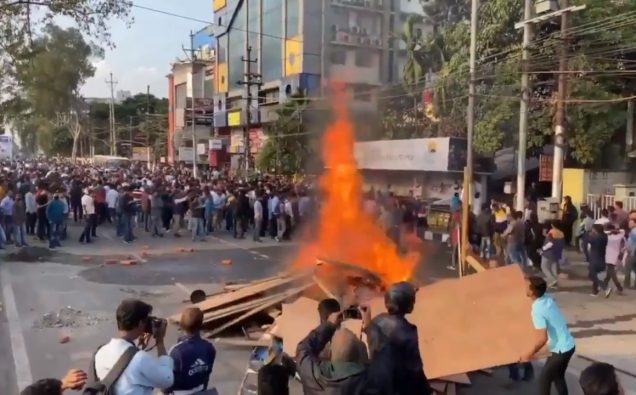
Amid widespread protests against exclusion of Muslims from seeking Indian citizenship, the United Nations has called the BJP Government’s Citizenship Amendment Act as “fundamentally discriminatory.”
The UN Human Rights Office reacted to the passage of the bill, known as CAB, as Indian police used force against protesters in Assam state, which borders Bangladesh and has a large Muslim population and fears that influx of people from other countries will change its ethnic complexion.
Demonstrations against the measures spread to several northeastern parts of the country and capital New Delhi. Prime Minister Narenra Modi’s ultrantioinalist government has suspended the Internet services in Assam in a replay of its ongoing restrictions in Kashmir.
protests against CAB and NRC in Tripura, Assam#BycottCAB #CitizenAmendmentBill pic.twitter.com/Z6C3m6dmpL
— Boycott Citizenship Amendment Bill (@BoycottCab) December 13, 2019
“The amended law would appear to undermine the commitment to equality before the law enshrined in India’s constitution and India’s obligations under the International Covenant on Civil and Political Rights and the Convention for the Elimination of Racial Discrimination, to which Indian is a State party, which prohibit discrimination based on racial, ethnic or religious grounds,” Jeremy Laurence, spokesman for the Office of UN High Commissioner for Human Rights Office, said in Geneva.
“Although India’s broader naturalization laws remain in place, these amendments will have a discriminatory effect on people’s access to nationality,” he said.
The controversial bill – enacted into law after its passage in both houses of the Parliament – would grant citizenship to minorities from Afghanistan, Pakistan and Bangladesh — all Muslim-majority nations but effectively shut doors on Muslims from seeking citizenship.
#India: We are concerned that the new #CitizenshipAmendmentAct is fundamentally discriminatory in nature. Goal of protecting persecuted groups is welcomed, but new law does not extend protection to Muslims, incl. minority sects: https://t.co/ziCNTWvxc2#FightRacism #CABProtests pic.twitter.com/apWbEqpDOZ
— UN Human Rights (@UNHumanRights) December 13, 2019
The UN Human Rights spokesperson said all migrants are entitled to respect, protection, and fulfillment of their human rights, while reminding that New Delhi endorsed the Global Compact for Safe, Regular, and Orderly Migration just a year ago.
“While the goal of protecting persecuted groups is welcome, this should be done through a robust national asylum system that is premised on the principle of equality and non-discrimination, and which applies to all people in need of protection from persecution and other human rights violations, with no distinction as to race, religion, national origin or other prohibited grounds,” Laurence said.
“We understand the new law will be reviewed by the Supreme Court of India and hope it will consider carefully the compatibility of the law with India’s international human rights obligations.”
The spokesperson also voiced concern over killings during protests in Assam.
“In the meantime, we are concerned at reports that two people have died and many including police officers have been injured in the Indian states of Assam and Tripura as people protest against the Act. We call on the authorities to respect the right to peaceful assembly, and to abide by international norms and standards on the use of force when responding to protests. All sides should refrain from resorting to violence.”


















